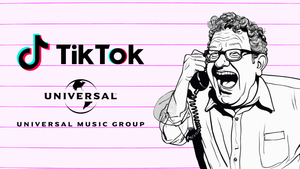Universal Music boss Lucian Grainge has sent a memo to his staff providing some more information about the major's all new licensing deal with TikTok.
Obviously keen to claim some wins following the company’s three month stand-off with the social media platform - given all the hassle it caused Universal’s artists and marketing teams - he talks up the new commitments TikTok has made. Those are grouped into the three areas of concern Universal raised in an open letter when the stand-off began: money, AI and platform safety.
He leads with AI, stating that “TikTok has now addressed the primary concern we expressed in our open letter that AI generated content would ‘massively dilute the royalty pool for human artists’”. Not only that, but “they have made a number of commitments regarding AI that demonstrate respect for our artists’ and songwriters’ works and ‘rights of publicity’, as well as support of UMG’s principles on AI, including on training without consent”.
Like the rest of the music industry, Universal is adamant that existing music must not be used to train a generative AI model without the permission of relevant copyright owners. It also wants AI companies to be transparent about what data they have used in their training and is looking for reassurances that an artist’s voice or likeness will not be imitated by AI without explicit consent.
“Our new agreement with TikTok will protect the integrity and value of human artistry and ensure that ‘fake artist’ AI content uploaded by third parties that misappropriates the identities of our artists and infringes upon their right of publicity can be removed. This new deal will extend artist protections even further and promote a better environment for authentic artist/fan engagement”.
Most of the music industry agrees with Universal regarding the obligations of AI companies developing generative AI tools and, in that respect, will be supportive of the biggest rights owner using its market power to get some sensible commitments from a platform as big as TikTok. And in his memo Grainge acknowledges the support Universal got from industry groups and even rivals once its big TikTok stand-off got underway.
That said, while most Universal-signed artists will agree that TikTok should get permission before using their music or voice in the AI domain, many of those artists would also like a similar commitment from Universal itself. Which is to say, where the major controls an artist’s recordings, it will seek artist consent before allowing an AI company to use those tracks.
Although the recent deal between the majors and US performer union SAG-AFTRA does provide some commitments of that kind, many artist groups continue to call for a wider industry commitment to ensure artists as well as labels will have control over what music is used to train generative AI.
Elsewhere in his memo, Grainge does find time to talk about the all important cash component of the new TikTok arrangement. “Under the new agreement, artist and songwriter compensation will be greater than under our prior TikTok deal”, he says, “and the total value UMG’s artists and songwriters garner from this partnership will be more closely aligned with other platforms in the social music category”. What that means for individual artists remains to be seen, but in the short term we can assume TikTok will be sending a bigger pile of cash to UMG HQ.

